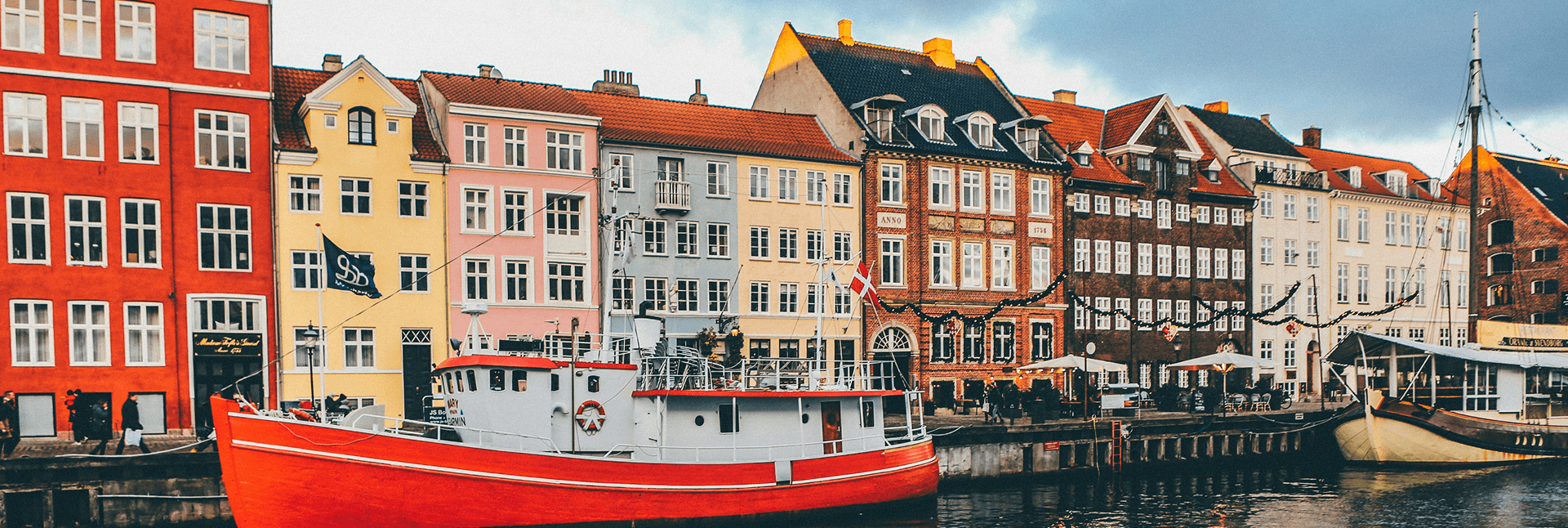
Study Destinations

Need help? Contact our experts
+(92) 345 2066 100Seek knowledge even if you have to go as far as China, for seeking knowledge is a duty on every Muslim.
Denmark

A Danish education puts you squarely in the middle of a well-built social paradise. Since the start of the UN's World Happiness Report in 2012, Denmark has consistently placed #1, earning them the reputation of having the happiest people in the world. Denmark offers happiness and the opportunity to pursue high-quality education in a welcoming, secure, and innovative atmosphere.
Studying abroad in Denmark will be exciting and rewarding, besides cementing a solid basis for your future profession. Moreover, the country offers cutting-edge healthcare, education, and civil freedoms and consistently appears among the safest and most livable nations.
Table Of Contents:
- Why study in Denmark?
- Admission requirements in Denmark
- Cost of studying in Denmark
- Scholarships for international students in Denmark
- Student visa requirements in Denmark
- Popular courses to Study in Denmark
- Post-Study work opportunities
- Book a meeting with an expert
Why Study In Denmark?
Since Denmark lacks significant natural resources, its main export is knowledge. Its focus on education indicates that Danish education is excellent and emphasizes creativity, innovation, analysis, and critical thinking. Additionally, their universities specialize in sustainability, innovation, entrepreneurship, and global perspectives, and their teaching is grounded in the most recent research. Their daring methodology permeates the educational system as well. By fusing conventional lectures with industry internships, Danish universities encourage self-motivation and problem-based learning, enabling students to apply their knowledge practically and equipping them for the demands of the global labor market.
Denmark has several very prestigious universities, such as the University of Copenhagen and the University of Southern Denmark, which are important reasons to study there. Additionally, universities like Roskilde University and Aarhus University are options for students.
Admission Requirements In Denmark
Background in Education
Undergraduate: Your degree needs to be equivalent to the Danish upper secondary school graduation certificate.
Graduate: Usually, a valid Bachelor's degree or its equivalent is necessary.
Academic Performance: In your prior studies, exhibit a strong level of academic performance. This might entail reaching minimum GPA criteria (you may have to convert from your grading system).
Certain Requirements: Programs may have certain field-related requirements or course prerequisites.
Get Free Consultation
Get a call-back within 24 hours
Application Documents
- Online application form
- Official transcripts
- Standardized test scores
- Motivation letter
- Letter of recommendation
- Portfolio
- Proof of financial Resources
Cost Of Studying In Denmark
In general, living expenses in Denmark are expensive. While the suggested monthly budget for smaller towns like Aalborg is about EUR 1,000, living in Copenhagen may cost anything from EUR 1,280 to 1,800 per month.
However, students from Switzerland and the EU/EEA should consider that Danish institutions do not charge tuition for these students, so they save a lot of money in this area.
Several students in Denmark dwell in off-campus residence halls because getting to Danish metropolitan areas by car is typically simple. Make friends and become settled by living in dorms, especially if it's your first year. Moreover, it is the least expensive choice; one may expect to pay between EUR 240 and EUR 460 monthly for living in residence halls.
Scholarships For International Students In Denmark
Through national and European programs, international students can apply for scholarships to study in Denmark as guests, as part of a double or combined degree, or as part of an institutional partnership. However, as part of the Danish Government Scholarship program, institutions in Denmark provide a limited number of scholarships and tuition waivers.
The selected scholarships available are for exceptionally gifted students from non-EU/EEU countries who have excelled academically. Additionally, all approved non-EU/EEA candidates are eligible for scholarships. Danish Government Scholarships are proof of Denmark's commitment to globalizing diversity and intellectual collaboration. Moreover, through superior education and research opportunities, these scholarships enable international students to succeed in their chosen disciplines and enhance their cross-cultural learning possibilities.
Popular Courses In Denmark
Business & Economics: Well-known universities with business programs include Aalborg University, Aarhus University, and Copenhagen Business School.
Engineering: Aarhus University, Aalborg University, and Technical University of Denmark (DTU) are all excellent in different areas of engineering.
Renewable Energy and Sustainability: Pioneers in sustainability teaching and research are DTU, University of Copenhagen, and Aarhus University.
Medical and Life Sciences: Prestigious medical and life science programs are available at University of Copenhagen, Aarhus University, and Southern Denmark University.
Design and Creative Industries: Well-known organizations in the subject of design include the Royal Danish Academy of Fine Arts, KEA—Copenhagen School of Design and Technology, and Kolding School of Design.
Student Visa Requirements In Denmark
- Letter of admission from an educational institution
- Details of the academic program
- Valid passport
- Passport-style photos
- Complete ST1 form
- Proof of English or Danish language proficiency
- Proof of financial resources to live in Denmark
- Details of your living arrangements
- Evidence of application fee payment
- Travel Insurance
Post-Study Work Opportunities
All non-EU/EEA/Swiss nationals will require a residence permit to work in Denmark. To work in Denmark, any non-EU, non-EEA, and non-Swiss nationalities will need a residence visa. After completing your degree program and holding a residence permit as a student in a Danish professional bachelor's, master's, or doctoral program, you may be eligible to apply for a residence permit, which will allow you to look for work in Denmark for a maximum of three years following your graduation from a Danish higher education institution.
If your passport still has validity, the Danish Agency for International Recruitment and Integration will automatically provide you a 3-year time to look for a job in addition to your study permit.
Moreover, the newly announced plan of educational reforms, which includes shorter master's programs and an extension of English-taught degrees in sectors with strong demand for specialized labor, includes the expansion of post-study job rights.
Book A Meeting With An Expert
Will you be going to Denmark to finish your studies? We are here to help you at every step! You can arrange a private consultation to discuss your possibilities for studying overseas. Furthermore, we offer suggestions for over 60 nations, irrespective of your preferences for Europe, Asia, or the Americas.
As part of our service, our team is dedicated to helping you achieve your study abroad goals and provides free consultations. Make an appointment with us right now, and we'll help you achieve your study abroad objectives!

